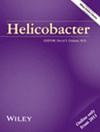Knowledge and Practices of Helicobacter pylori Infection Management Among Physicians in Gansu Province, China: A Cross-Sectional Study
Abstract
Background and Aims
Physicians' knowledge and practices regarding the diagnosis, treatment, and follow-up of Helicobacter pylori (H. pylori) infection can impact the effectiveness of eradication therapy. This study aimed to investigate the current state of knowledge and practices concerning H. pylori infection management among physicians in Gansu Province, northwest China.
Materials and Methods
From October to November 2023, 557 physicians from 14 cities and prefectures in Gansu Province participated in this multicenter cross-sectional study and completed a survey questionnaire.
Results
A total of 519 valid questionnaires were collected. 43.2% of the physicians supported H. pylori screening for high-risk populations or individuals with H. pylori–related diseases. The awareness of target screening populations varied among these physicians, ranging from 69.6% to 98.2%. Most physicians preferred the urea breath test (UBT) as the method for diagnosing H. pylori infection (98.3%) and for follow-up after eradication therapy (98.5%). 89.6% of the physicians preferred bismuth-containing quadruple therapy for initial eradication, with amoxicillin and clarithromycin being the most commonly used antibiotic combination (56.3%). In addition, 84.6% of the physicians indicated that they would inquire about the antibiotic usage history for most patients before treatment, 93.8% would ask patients about their previous eradication history, and 94.2% would inform patients about treatment-related considerations. However, only 43.5%, 27.7%, and 29.7% of the physicians were aware of the high resistance rates of H. pylori to clarithromycin, levofloxacin, and metronidazole, respectively, in Gansu Province. Subgroup analysis revealed that the performance of gastroenterologists, nongastroenterologists, and physicians from different levels of hospitals differed in the diagnosis, treatment, and follow-up of H. pylori infection.
Conclusions
Knowledge and practices regarding H. pylori infection management among physicians in Gansu Province, China, need further improvement. Strengthening targeted continuing education to increase the overall management level of H. pylori infection is recommended.

 求助内容:
求助内容: 应助结果提醒方式:
应助结果提醒方式:


